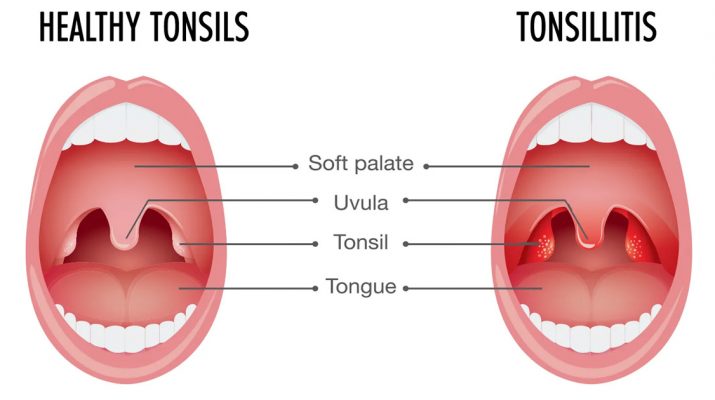Tonsillitis, though commonly a child’s ailment, affects people of all ages. The condition is characterized by an inflammation of the tonsils located at the back of the throat. It develops because of a bacterial infection or virus.
While there are ways to positively treat the symptoms of tonsillitis, including a surgical procedure for recurring conditions, the best remedy is always prevention.
Here Are 10 Early Signs Of Tonsillitis And How To Get Rid Of The Symptoms:
“The throat also represents the creative flow in the body. This is where we express our creativity, and when our creativity is stifled and frustrated, we often have throat problems. Tonsillitis and thyroid problems are just frustrated creativity, resulting from not being able to do what you want to do.” – Louise Hay
1. Inflammation And Swelling Of The Throat
Inflamed and swollen tonsils can be uncomfortable and might make swallowing food or drinks difficult. The inflammation usually causes the throat to appear red and feel tender. The lump on the throat can be bothersome as well, as it’s not just the tonsils that are swollen. Even the lymph nodes, the neck, and the area under the chin could be sensitive and tender. Drinking warm tea with raw honey can relieve inflammation and swelling.
2. Pain In The Throat
It’s common to feel pain when the tonsils are inflamed and swollen since the glands are irritated and stretched. The only way to relieve the pain is to relieve the inflammation. Gargle water with dissolved salt for best relief from this condition, as per the National Institutes of Health. But it’s also best to consult a doctor for an antibiotic treatment regimen.
3. Difficulty In Breathing Or Talking
Aside from making eating hard, you could have problems breathing properly when you have developing tonsillitis. Because your glands are swollen, it can block the airways in your throat so it’s also an effort to talk. You might want to use a vaporizer or humidifier in your room to help clear the airways.
4. Change In Your Voice
Because of what’s happening inside your throat, your voice might slightly change and become muffled, according to the American Academy of Otolaryngology-Head and Neck Surgery. You might also experience difficulty in opening your mouth. If gargling with salt and water won’t help, you could take lozenges containing benzocaine to relieve your throat.
5. Ear Pain With A Headache
The pain of tonsillitis might spread over the ear as the nerves on the back of the throat become inflamed. If the pain impacts the ears, it can cross over to the head as well. You could take over-the-counter painkillers to clear your headache and provide temporary positive relief. However, if the root of the problem isn’t addressed, which are your tonsils, the headache can recur.
6. Bad Breath
Developing tonsillitis might cause bad breath because of the increasing bacteria inside your mouth. Since you won’t have the appetite to eat when it’s too painful to swallow, your stomach might produce chemicals that can cause bad breath as well.
The tonsil stones that form at the back of your throat can leave your mouth smelling bad – and brushing your teeth won’t help remove the odor. According to dentist Thomas P. Connelly via Huffington Post, the tonsil stones have to be removed with an irrigator at the dentist’s clinic. To prevent the stones from forming, it’s a good idea to gargle with a mouthwash twice a day. Otherwise, a doctor might recommend removing the tonsils altogether as a final resort.
7. Presence Of White Coating
If you open your mouth wide and notice white spots around your tonsils, this is a sure indication of a bacterial infection. This is also a sign that your condition might be contagious, so be sure to cover when you cough or sneeze. If possible, limit your contact with other people or wear a mask when you do have to come face to face with people.
8. Flu
Influenza or flu might trigger complications in your tonsils because of your weakened immune system. If you have the flu, give yourself a complete bed rest so that your body can recover faster and you won’t have to deal with the complications. Drink plenty of fluids and take your flu medication as prescribed as well to speed up your recovery.
9. Cold Sores
Cold sores, also known as herpes simplex virus, cause blisters and bumps around your mouth and lips. If this is not treated properly, it could lead to tonsillitis because of the presence of the bacteria around your mouth area.
10. Strep Throat Infection
Developing a strep throat infection can also lead to tonsillitis. If you are experiencing pain and discomfort in your throat along with fever and body pain, get yourself tested. If needed, take the treatment for Streptococcus bacteria so that it won’t progress to tonsillitis.
Best Treatment Course
In general, treating tonsillitis involves positive thinking and an antibiotic regimen, pain management, and fluid replacement therapy. In severe cases, hospitalization might be warranted especially if your condition affects the way your body functions and disrupts your activities. Tonsillitis that becomes chronic might have to be removed through a surgery called a tonsillectomy. Please always consult your wellness advocate before starting any new regimen.

